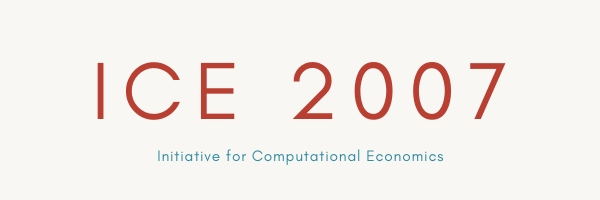
ICE 2007 Home — ICE Home Page — Ken Judd’s Home Page
Program Description
Modern economic theory is producing increasingly realistic and sophisticated models. However, computational challenges have limited their application to empirical analysis and policy evaluation. Instead, economists use ad hoc methods with poorly understood properties that produce approximate solutions of unknown quality. The Institute on Computational Economics aims to raise the level of computational sophistication in economics by creating an interface between economists and computer scientists. Leading computer scientists and numerical analysts join with leading economists to analyze the computational challenges presented by broad classes of economic models that economists want to apply to data and policy analysis. The institute’s goal is using state-of-the-art numerical methods and computer technology to develop new techniques that address the unique problems posed by modern economic models and their econometric estimation. A standing committee of experts from the University of Chicago and Argonne National Laboratory has assembled leading scholars, promising young scholars and graduate students in economics, computational sciences and applied mathematics to promote the exchange and development of computational research tools as well as fostering a world-wide community in an emerging area of science.
The 2007 Institute on Computational Economics will bring together a diverse group of academic participants: experts in policy, microeconomics, macroeconomics, model building, estimating and testing, statistical methods, computation, algorithm development, applied mathematics, and numerical analysis for two weeks, July 30-August 9. Summer institute activities will begin with formal morning tutorials on computational topics together with afternoon sessions that will familiarize participants with modern software tools. In the first week, participants will begin work on group computational projects that they will present in the second week. The second week will also include seminar presentations by leading economists featuring recent advances in quantitative economic policy research. Throughout the Institute, there will be numerous opportunities for less formal interactions with lecturers and fellow participants, including a poster session where participants can present their current research. Participants will also be invited to schedule “office hours” with lecturers where they can discuss their research ideas and get feedback from these computational experts.
In general, the program targets young scholars interested in learning new analytical and computational methods and application to their own work, those interested in current findings and applicability to other research, and those with backgrounds in math and computer science who are interested in state of the art applied mathematical tools and their application to substantive policy research.